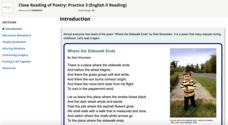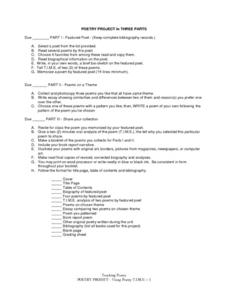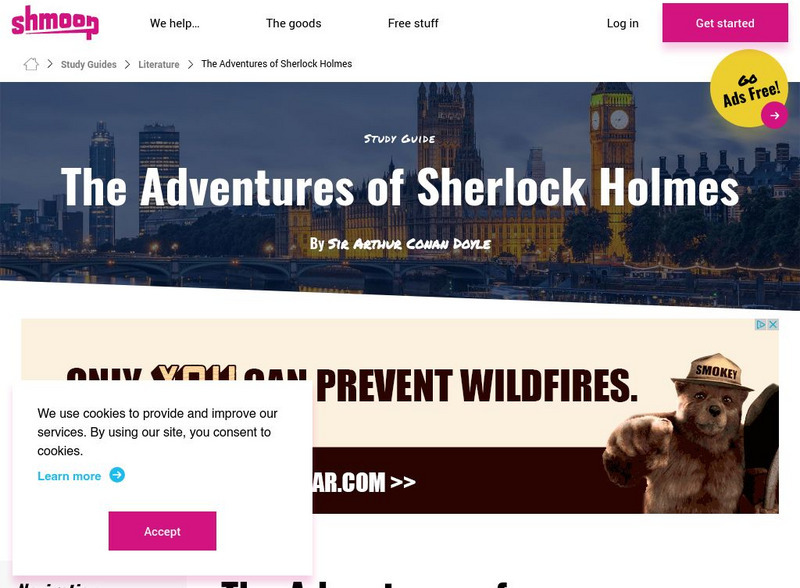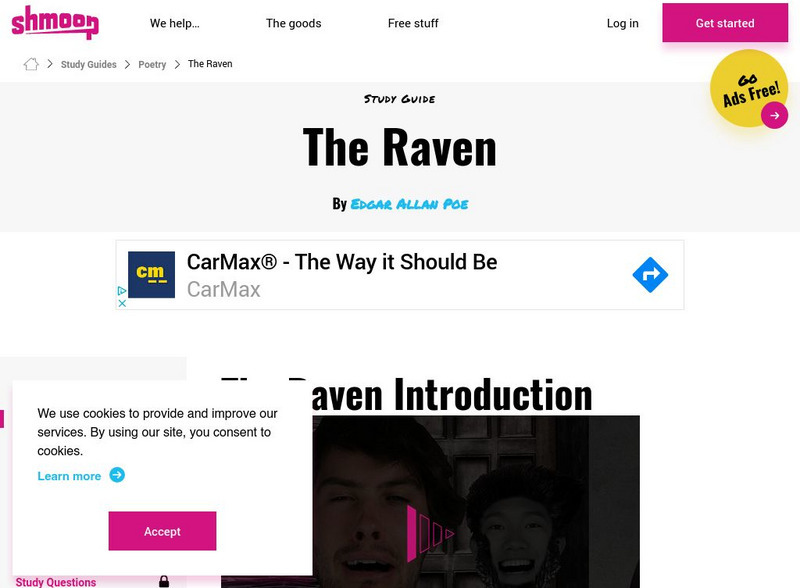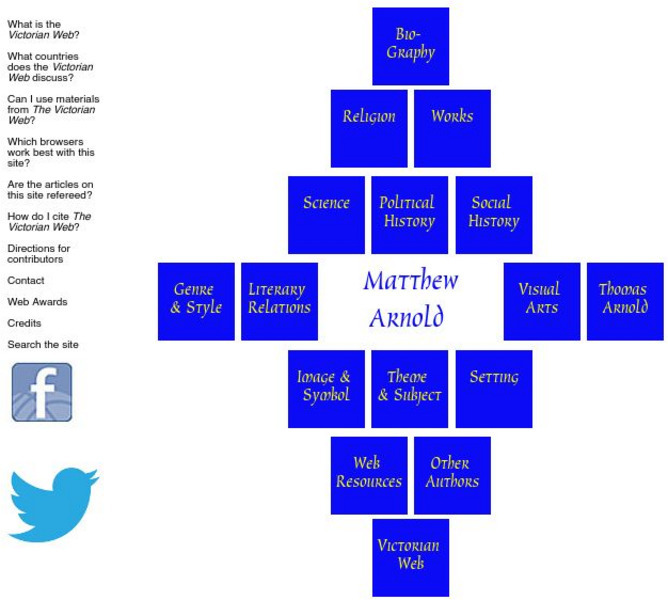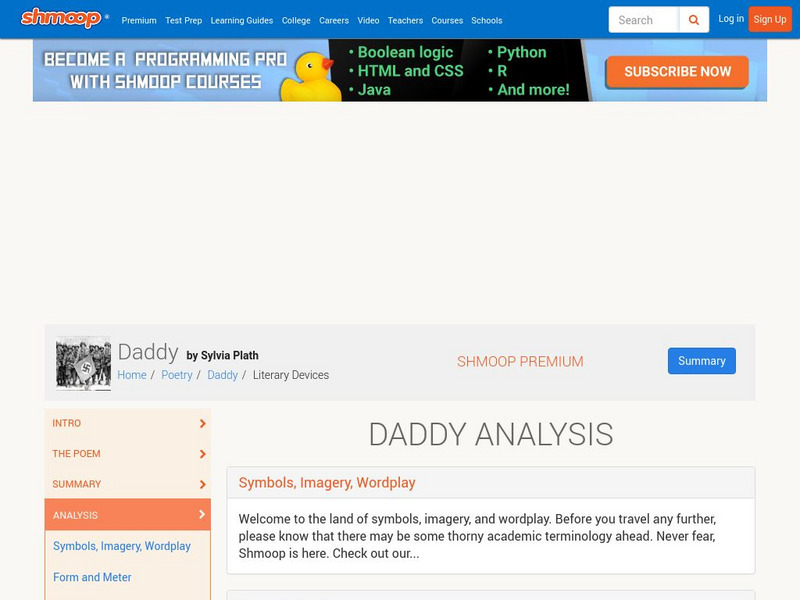Curated OER
The Old Man and the Sea: Guided Imagery
What do you imagine when you think of the sea? Put on some ocean sounds, close your eyes, and listen to a guided meditation based on the imagery from The Old Man and the Sea by Ernest Hemingway. After class members listen to...
Novelinks
Tuck Everlasting: Similes, Metaphors, and Personification in Imagery
Poetic language is abundant in Natalie Babbitt's beautiful novel, Tuck Everlasting. Learners note the examples of similes, metaphors, and personification they find as they read, and illustrate how the language creates a sensory...
National Endowment for the Humanities
Practical Criticism
As an introduction to literary criticism, class members recreate I.A. Richards' close reading experiment. Individuals select a poem, paraphrase the story, focus on the imagery used, consider what the imagery adds to the tale, and...
Texas Education Agency (TEA)
Close Reading of Poetry: Practice 3 (English II Reading)
Poems by Shel Silverstein, Emily Dickinson, Jean Toomer, Maya Angelou, and others offer users of the final interactive in a ten-part set to demonstrate what they have learned about how writers use imagery, metaphors, allusions, and...
Poetry4kids
How to Write an Exaggeration Poem
The best poetry writing lesson of all time is here for you! Learn all about the art of exaggeration with a lesson on exaggeration poems, which instructs students to use wild imagery to convey their message.
Curated OER
World Literature: The Inferno Essay
In this literature analysis worksheet, studnets read Dante's Inferno and write an introduction with a thesis statement. Students give a synopsis of the comedy and then write an essay. Students select from the five options to complete the...
Teaching English
Poetry Project in Three Parts
It’s poetry T.I.M.E! Individuals use the T.I.M.E. format (T = Title, thought, and theme; I = Imagery and figurative language; M = music and sound; E = emotion) to study a poet, collect poems that have a similar theme, and create a...
Prestwick House
The Grapes of Wrath
At over 450 pages, John Steinbeck's Pulitzer Prize winning novel The Grapes of Wrath can be a challenging choice for full-class, book circle, or independent reading. The activities in a 10-page sample The Grapes of Wrath...
Infobased Learning
Bloom's Literature: How to Write about Nineteen Eighty Four
A good prompt is hard to find, especially ones that encourage application, analysis, synthesis, and evaluation of a text. Help is here in the form of a prompt list for George Orwell's Nineteen Eighty Four that offers essay topics that...
Japan Society
The Russo-Japanese War, 1904-1905: A Turning Point in Japanese History, World History, and How War is Conveyed to the Public
The big question: How did Russo-Japanese War imagery and the press influence Japanese perception of the war? Learners consider this big question as they compare and contrast various artistic media from the period. The lesson is...
Prestwick House
Anne Frank: The Diary of a Young Girl
Pre-reading worksheets, discussion prompts, activity ideas, research assignments, and more await you in this resource for supplementing your class reading of The Diary of a Young Girl by Anne Frank.
Schools Linking Network & Lifeworlds Learning
How Do We All Live Together?
Explore the concepts of community and point of view with these activities complementing the children's book Voices in the Park by Anthony Browne. Following a class reading of the story, ask students to either draw a map of the...
Quizlet
Quizlet: Literary Elements/humorous Fiction Terms Flashcards
Literary elements are included in this review exercise. Flashcards are provided for the following words: allusion, antagonist, dialogue, flashback, imagery, protagonist, symbol, dialect, hyperbole, idiom, irony, parody, pun, sarcasm,...
Texas Education Agency
Texas Gateway: Literary Text: Close Reading of Poetry: Practice 3
This lesson will help you comprehend the poet's meaning by giving you practice in finding imagery, metaphors, symbolism, and allusions.
Shmoop University
Shmoop: Hamlet Symbolism, Imagery, and Allegory
Find out how Shakespeare using symbolism, imagery and allegory in his play Hamlet.
Shmoop University
Shmoop: The Adventures of Sherlock Holmes
This site explores the characters, plot and themes found in The Adventures of Sherlock Holmes. Read about the symbols, imagery and allegories presented in The Adventures of Sherlock Holmes.
Shmoop University
Shmoop: The Love Song of J. Alfred Hitchcock
This comprehensive site contains a thorough analysis of The Love Song of J. Alfred Prufrock. Included are a discussion of symbols, imagery and wordplay. Included are a list of excellent questions on the poem
Shmoop University
Shmoop: The Raven
Read about Edgar Allan Poe's famous poem The Raven. This site contains insights into the the symobls, imagery and wordplay found in the poem as well as useful study questions.
Victorian Web
The Victorian Web: Matthew Arnold
This Victorian Web site features links to documents about the life, works, and times of the poet and critic Matthew Arnold (1821-1888). Content ranges from the genre, themes, and imagery found in his literary works, to a biography,...
Shmoop University
Shmoop: Daddy
Sylvia Plath's fascinating poem, Daddy, is analysed in terms of imagery, form and themes in this comprehensive site. The study questions provide excellent material for discussion.
Shmoop University
Shmoop: To Kill a Mockingbird
Analysis of the plot of To Kill a Mockingbird includes the symbolism, imagery, and allegory used. Shmoop also provides a summary and information on the themes and characters.
Other popular searches
- Literary Imagery Kubla Khan
- Literary Imagery Kublai Khan
- Literary Imagery 1st Grade
- Literary Imagery Worksheet



